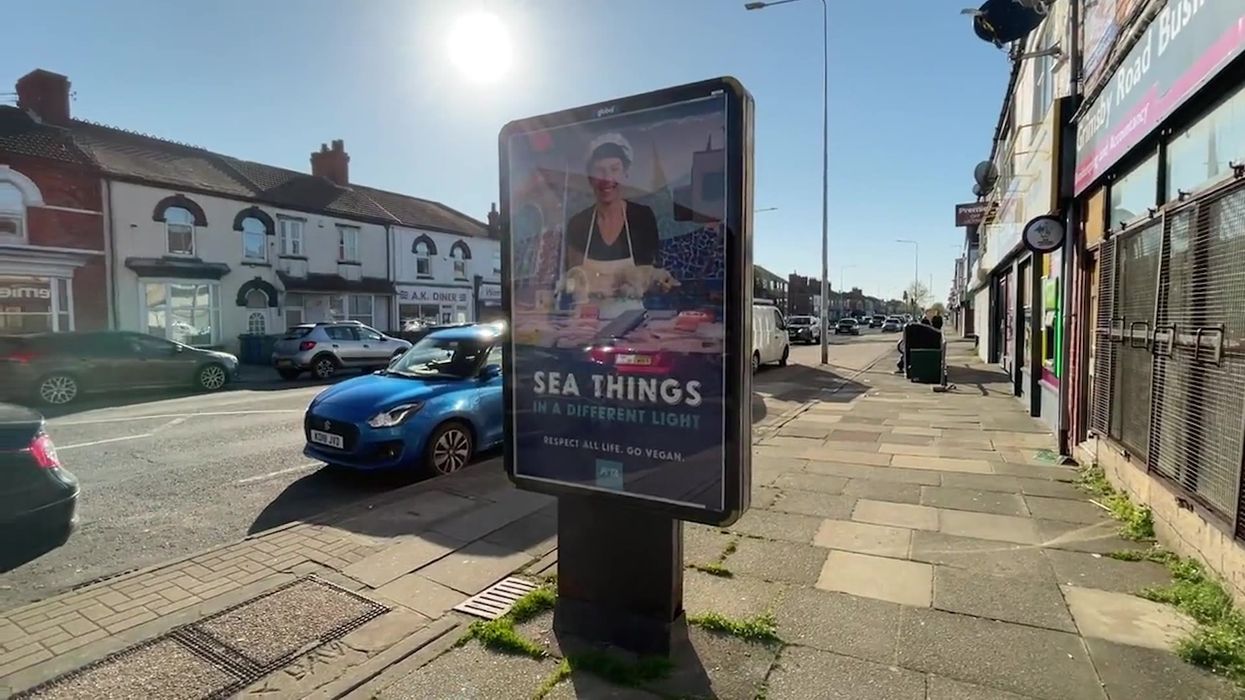Peta erects poster outside chip shop comparing eating fish with eating a dead cat
In the world of politics, a ‘dead cat’ is a strategy used by politicians to direct attention away from an issue by presenting something a lot more shocking. But in the eyes of controversial animal rights charity Peta, a dead cat is a way of encouraging more people to go vegan – apparently.
Back in April, the organisation revealed it had put up a billboard advertisement in the seaside town of Cleethorpes, in Lincolnshire. The blog post announcing the advert came with a headline which made the argument that “eating a fish is like eating a cat”.
The charity wrote: “From one angle, you may see a smiling fishmonger holding a dead fish, but from another, she is holding a dead cat.
“This unsettling sight has been erected by Peta to provide locals with food for thought.
“Fish – like cats and other animals – are intelligent, sensitive individuals. If you wouldn’t eat your animal companion, go vegan and don’t eat sea life.”
At the time, the campaign was ridiculed by users online – not least because cats… well… eat fish:
And while some thought the advert was silly, others thought it was distressing, to the extent that 10 complaints were made to the Advertising Standards Authority (ASA) about the nature of the ad and whether it was “excessively distressing” and likely to “cause serious and widespread offence”.
The complainants also questioned whether the ad was “responsibly targeted”, given it was in a public place – near a fish and chip shop – where “children could see it”.
When approached by the ASA for a response as part of its investigation, Peta said the ad intended to “promote veganism by challenging the societal tendency to treat animals merely as a means of fulfilling human desires”, and that it sought to “question the widespread assumption that certain species were more deserving of compassion than others”.
The ruling continues: “[Peta] felt that those preconceptions were evident from the complaints themselves, given the ad had featured two dead animals, while only the cat’s depiction had been seen as having the potential to cause distress.
“They said that the cat’s portrayal was not graphic and had been carefully designed to minimise any risk of distress. It was not depicted with any external wounds, or other outward indicators of injury or suffering.
“They said that the ad’s portrayal of dead animals was justified by the urgency with which society ought to address the moral and environmental harms linked to commercial fishing.”
The charity also argued that children “frequently encountered dead animals in everyday contexts”, giving the supermarket as an example.
Meanwhile Global, the company which owns the billboard, said they had sought guidance from the copy advice team at the Committee of Advertising Practice (CAP) – the organisation which draws up the advertising code advertisers are expected to follow.
The CAP found it was unlikely to breach the Code, and Global added it did not violate their own guidelines, they didn’t receive a complaint themselves, and the billboard was no longer on display.
In their assessment, the ASA said: “[We] acknowledged that some viewers would find the ad unsettling or distasteful. However, we considered that viewers would understand that the ad was for an animal justice charity, promoting the vegan diet, and that it aimed to challenge societal norms regarding the moral significance of meat consumption.
“We considered that the cat’s depiction was neither gruesome, nor shocking, and was unlikely to be considered particularly realistic by most viewers. On that basis, we considered that viewers, including children, were unlikely to regard the image as relatively mild.
“For that reason. We concluded that the ad was not excessively distressing, or likely to cause serious or widespread offence, and had not been irresponsibly targeted.”
Sign up to our free Indy100 weekly newsletter
Have your say in our news democracy. Click the upvote icon at the top of the page to help raise this article through the indy100 rankings.














